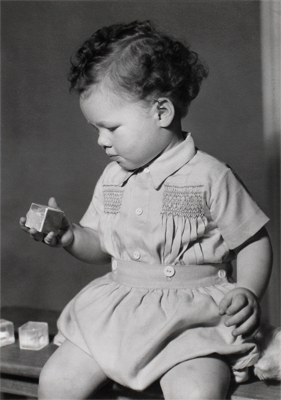... In reality, newborn babies are neither beautiful nor ugly. Their parents don't love them because they are pretty, but because they are the mother and father of this touching, fragile, shapeless creature that has just survived a gruelling journey, perilous to mother and child, into the outside world.
But an image of a newborn the size of a small whale is conspicuously ugly. The very dimensions of the object negate its essential nature, and turn the small and the fragile into the monstrous.
The human body has a proper proportion, at which we respond to it as fully human: as Gulliver's Travels so memorably demonstrated, and as Mueck's models here amply confirm, the oversized is grotesque and the miniature is merely quaint.
But as already suggested, it is more than a matter of mere ugliness. ...
Christopher Allen
LARGER THAN LIFE
Ron Mueck
National Gallery of Victoria until 18 April
David Jones, artist and poet (1895-1974) begins his PREFACE TO THE ANATHEMATA :
'I have made a heap of all that I could find.' (1) So wrote Nennius, or whoever composed the introductory matter to Historia Brittonum. He speaks of an 'inward wound' which was caused by the fear that certain things dear to him 'should be like smoke dissipated'. Further, he says, 'not trusting my own learning, which is none at all, but partly from writings and monuments of the ancient inhabitants of Britain, partly from the annals of the Romans and the chronicles of the sacred fathers, Isidore, Hieronymous, Prosper, Eusebius and from the histories of the Scots and Saxons although our enemies . . . I have lispingly put together this . . . about past transactions, that [this material] might not be trodden under foot'. (2)
(1) The actual words are coacervavi omne quod inveni, and occur in Prologue 2 to the Historia.
(2) Quoted from the translation of Prologue 1. See The Works of Gildas and Nennius, J.A.Giles, London 1841.
(1) The actual words are coacervavi omne quod inveni, and occur in Prologue 2 to the Historia.
(2) Quoted from the translation of Prologue 1. See The Works of Gildas and Nennius, J.A.Giles, London 1841.
20 February 2010
In reality, ...
In the Review supplement of the Weekend Australian, Christopher Allen, writes :






